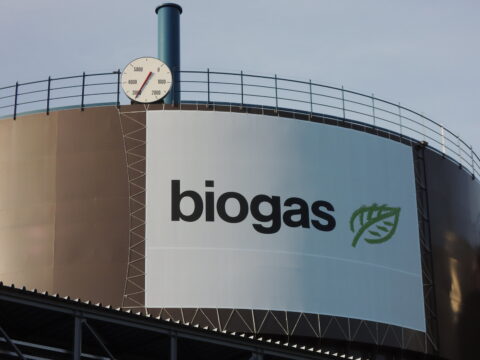Investigation
What Does a Small Town Do When the Water Is Undrinkable?
Climate•8 min read
Perspective
The industry's quiet campaign to greenwash its image has a new partner in crime: the emerging biogas industry.


Words by Wenonah Hauter
Over the past months, while communities have been struggling to meet basic needs like water and health care, bad-acting corporations like Tyson and Smithfield fight (or quietly settle) class-action lawsuits over their refusal to protect their workers during a global pandemic. They’ve also been leading a quiet campaign to dupe Americans into accepting their carefully crafted narrative of being “good stewards of the planet.” Supporting this false narrative is a new polluting partner in crime: the emerging biogas industry.
Biogas, sourced from factory farm manure and processed in massive “digesters,” is the latest dirty energy to be backed by a greenwashing campaign from Big Ag and Big Gas. Biogas technology is being promoted as “renewable natural gas,” and as a solution to air and water pollution across the United States. In 2018, Dominion Energy and Smithfield Foods signed a half-billion-dollar agreement to promote biogas, citing their companies’ greenhouse gas emission reduction goals. “Our partnership is revolutionizing the future of sustainable energy and agriculture in this country, and we are thrilled to partner with Smithfield to grow this exciting new industry,” Dominion stated at the time.
In reality, the promotion of biogas as “renewable” by agribusinesses and the energy industry is misleading and harmful. Burning dirty biogas releases carbon dioxide and other pollutants, including smog-forming nitrogen oxides, ammonia, and hydrogen sulfide. Additionally, biogas is comprised of more than 50 percent methane, a potent greenhouse gas that’s nearly 90 times more powerful than carbon dioxide over many years.
Beyond the climate implications, the biogas industry creates a host of problems on the ground. It relies on factory farms that are typically located in low-income areas and communities of color. The operation of digesters in these communities only exacerbates existing environmental degradation through increased mega-farm activity, increased diesel pollution from trucks and equipment, and the construction of a vast web of new underground pipelines to transport the gas to market. In addition to these pipelines being a constant explosion threat, their placement requires the disruption and destruction of rural landscapes, natural habitats, and sometimes even homes.
Meanwhile, with the aid of complicit local leaders and laws written by industry-friendly legislators, biogas infrastructure is expanding at a troubling pace. In Delaware and Maryland, factory farm biogas plots are churning with an incredible lack of transparency. Right now, a massive digester and tanker truck project is being developed in Delaware to process poultry litter in the region. It’s a plan designed in part to respond to ongoing concern about excess manure and phosphorus throughout the Eastern Shore of Maryland. Perdue, one of the nation’s largest poultry producers, is hoping the third time’s a charm, as the facility is being built at the site of their failed pelletizer and composting plants—and because it’s committed to a 20-year agreement with biogas giant Bioenergy DevCo. By creating a market for factory farm waste, this project will entrench factory farms on the Eastern Shore for decades.
In Iowa, a planned biogas conference was canceled at the beginning of the pandemic, but the same group was awarded a new federal grant just last month to develop new methods of turning manure into gas. Iowa State University, Penn State, and Roeslein Alternative Energy were awarded the five-year, $10 million grant from the U.S. Department of Agriculture’s National Institute for Food and Agriculture.
Simultaneously, Congress has repeatedly sought to fan the biogas flames. First to come was the Agricultural Environmental Stewardship Act, introduced last summer. During the pandemic, its lead sponsors—Senators Sherrod Brown (D-Ohio) and Pat Roberts (R-Kansas), and Rep. Ron Kind (D-Wisconsin)—have been peddling biogas by asking Agriculture Secretary Sonny Perdue to bail out the industry at the apex of the pandemic. The legislation, which would offer huge financial breaks to companies looking to profit off digester technology, hasn’t made much forward momentum, but it is still alive and well.
Then came the industry-supporting Agriculture Resilience Act. Introduced in the House before the pandemic in February, the lead sponsor, Representative Chellie Pingree (D-Maine), was the keynote speaker alongside World Bank leaders at a conference hosted by the World Biogas Council in May 2020. According to organizers, the event “aims to maintain the international dialogue amid worldwide COVID-19 lockdowns, and highlight the use of biogas worldwide, understand the barriers preventing growth and policy contexts, identify potential solutions, discuss new innovations and address technological challenges and opportunities.”
The Growing Climate Solutions Act, another bill introduced during the pandemic—by Senators Mike Braun (R-Indiana), Debbie Stabenow (D-Michigan), Lindsey Graham (R-South Carolina), and Sheldon Whitehouse (D-Rhode Island)—has bipartisan support and is most likely to advance. The legislation aims to open carbon markets to farmers, allowing for fuller monetization of digester and biogas operations—and the filthy waste supplying them.
But there are good bills in Congress as well. For example, Sen. Cory Booker’s (D-New Jersey) Farm System Reform Act calls for major agricultural reforms that uplift independent family farmers, protect rural communities and public health, and overhaul our corporatized food system. Among the reforms is an immediate ban on the construction of new large factory farms or the expansion of existing ones, while also initiating a phaseout of existing large factory farms by 2040.
The Farm System Reform Act would go a long way toward squashing the toxic biogas industry and, most notably, transforming our entire food system for the better. But from a climate perspective, fighting biogas is just one small piece of a remarkably complex clean energy puzzle. Science tells us that in order to maintain hope of avoiding the most catastrophic, irreversible effects of climate change, we must solve the puzzle quickly—likely within the next decade.
Among many other things, solving the puzzle will require a quick halt to all new fossil fuel development, including fracking, and an aggressive national mobilization to develop solar and wind power on a massive scale. Increased energy efficiency standards across our economy must be a part of the solution as well.
In the meantime, the burgeoning biogas industry poses a direct threat not only to our fragile climate but also to the health and environment of countless vulnerable communities on the front lines of the filthy factory farm and manure digestor industry. We can and must act to shed exposing light on the truth behind the industry and halt it in its tracks.
